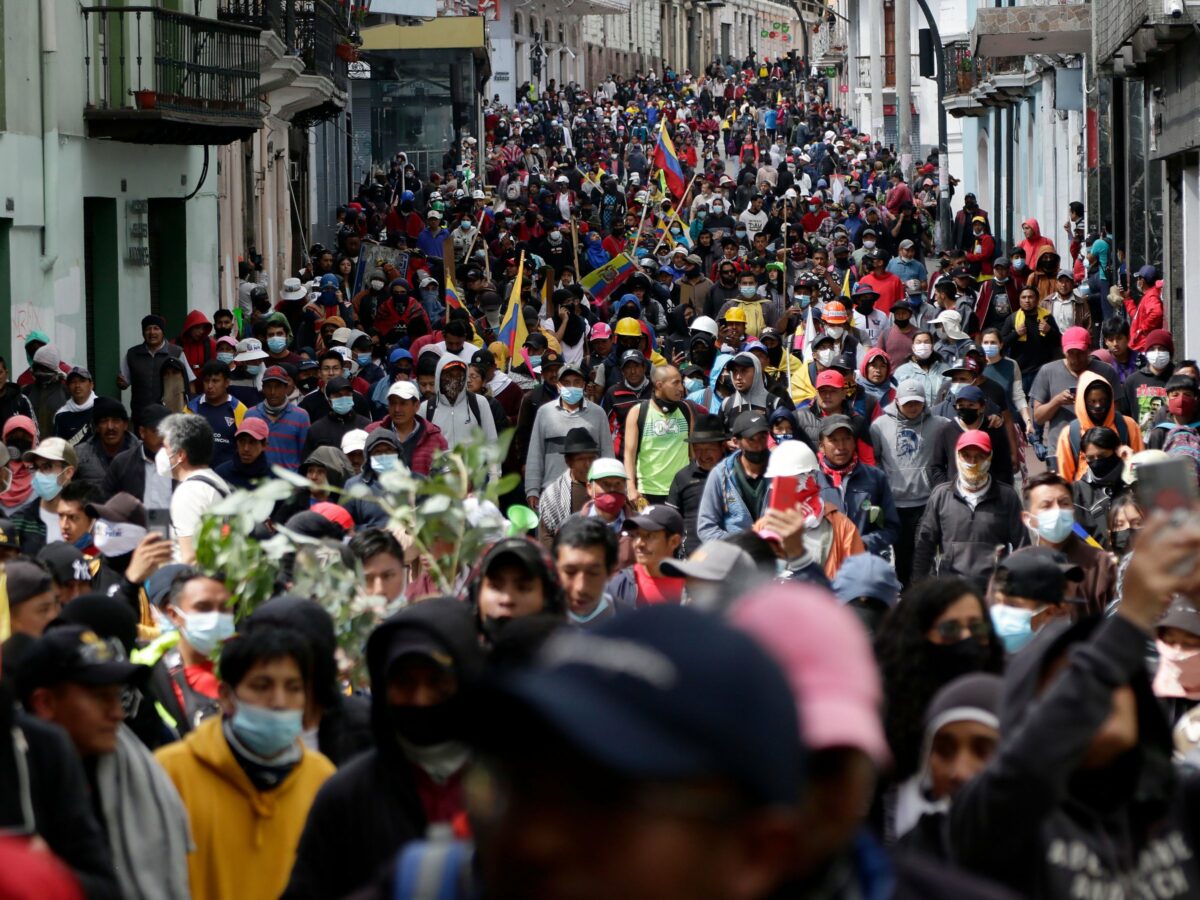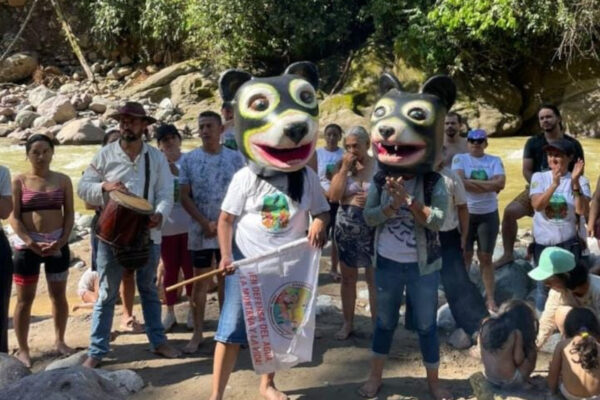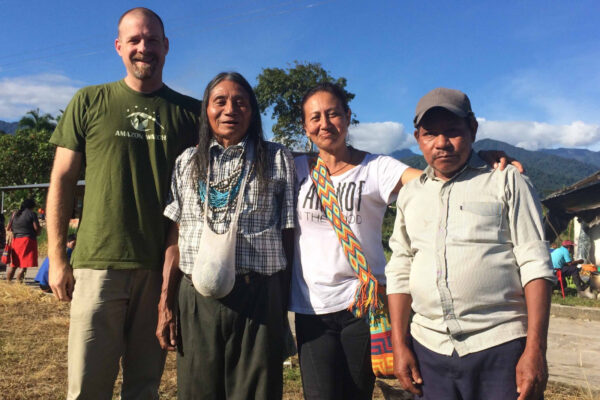A wave of uncertainty and concern has gripped Ecuador over the state of rights and the future of democracy after right-wing President Guillermo Lasso invoked Article 148, known as the “muerte cruzada” clause in the country’s constitution last week, dissolving congress and convening new elections.
Amid the political turmoil in Quito, oil spills in the Amazon continue unabated. On May 11, a new spill from Petroecuador’s SOTE pipeline spewed crude into the Conejo River for hours until it was finally controlled. Local organizations estimate an average of two spills a week, contaminating crops, forests, and water sources that communities depend on for drinking, bathing, and fishing.
The uncertainty of this political situation creates significant threats in the Amazon, beyond the systemic pollution by Petroecuador. At Amazon Watch, we are amplifying human rights organizations monitoring the upcoming election process. Civil unrest in Ecuador has historically resulted in the violent crackdown on protesters and criminalization of Indigenous leaders, including rights violations where Amazonian Earth Defenders face increasing persecution and threats. For example, the government repressed demonstrators in 2022 when the Indigenous movement demanded to stop the advance of the oil and mining policy in the Amazon. Lasso’s consolidation of power exacerbates the risk to environmental defenders like Eduardo Mendúa, who was killed in front of his home, allegedly for organizing community opposition to Petroecuador’s oil drilling plans.
“We are normally invisible to the government,” said Donald Moncayo, president of Union de afectados de Texaco- Chevron (UDAPT). “But political chaos in Quito puts us at greater risk than ever. We know the extractive industries will take full advantage of this moment, and lack of accountability and impunity will only grow. We need the eyes of the world on Ecuador more than ever.”
Citing “grave political crisis and internal unrest,” Lasso’s use of the muerte cruzada clause was the first time it has ever been invoked. Conveniently, Lasso resorted to Article 148 on the second day of his impeachment trial over corruption charges. He was also facing low poll numbers and widespread discontent with his handling of the economy, crime, and a spiraling wave of narco-violence that has overwhelmed the country.
Lasso opted for the political nuclear option after it became clear he didn’t have the votes in congress to survive impeachment and claimed it was his only option to thwart efforts by his political opposition to facilitate the return of former President Rafael Correa, who has been living in exile in Belgium to avoid a jail sentence for corruption. Without a legislative branch, Lasso will govern by executive decree until emergency elections are held, with the country’s Constitutional Court being the only backstop on any abuse of power.
Civil society and human rights organizations expressed their concern over the situation, warning of the heightened risk of rights abuses, and called on the court to diligently and effectively fulfill its role as the “highest branch of control, constitutional interpretation, and administration of constitutional justice.”
Shortly after the announcement, military and police publicly expressed their support for Lasso and surrounded the congress building. Communities in the Amazon reported an increase in military presence around oil wells and infrastructure.
The brazen move is stoking fears over Lasso’s agenda and the ability of the court to protect the rights of citizens and democracy. While any executive decree under the muerte cruzada clause is limited to “economic emergency,” this overly-broad category could involve anything from fiscal, labor, extractive industry, natural resources, infrastructure development, and privatization of services, among others that have wide sweeping implications for collective and economic, social, and cultural rights.
Indeed Lasso is considering a package of business-friendly reforms that would privatize strategic sectors of the economy like energy, telecommunications, and public works – reforms he was previously unable to pass through congress. He has already issued two decrees on tax reform. Many of these possible reforms are what gave rise to the June 2022 protests by CONAIE, the National Indigenous Confederation. If enacted by executive order and approved by the Constitutional Court, mobilizations from Indigenous and social movements are likely. But unlike the June 2022 strike, the Lasso government is now armed with a decree issued in March that allows the armed forces to act inside the country to combat “terrorism” as defined by the government, which has been quick to use the label to stigmatize and delegitimize Indigenous organizations. Lasso also issued an executive order in April that allows citizens to carry arms and use them in self-defense.
The Inter-American Commission on Human Rights issued a statement urging the country to continue “guaranteeing the protection of the human rights of all people, the right to freedom of expression, the right of association, peaceful assembly, and the right to citizen participation; fundamental pillars of a democratic society. The independence of the powers and respect for the democratic constitutional order are essential elements to guarantee the full enjoyment and exercise of human rights for all persons.”
The first test for the court – the country’s third pillar of government essential for the separation of powers – doesn’t bode well. Lasso’s political opposition and civil society organizations filed six separate legal actions arguing that Lasso’s declaration of muerte cruzada was invoked solely to save him from impeachment, failed to meet the threshold of internal unrest, and was therefore unconstitutional. The court rejected all six, citing a lack of jurisdiction.
New presidential and congressional elections have been called for August 20, 2023 to finish out the current terms until 2025. If no candidate wins outright, a run off would take place on October 15. Lasso has said he will not run.
Extractivism on the ballot
The special election will also be combined with two historic referendum questions that would restrict oil and mining.
The first is a national referendum on whether to keep the country’s largest oil fields permanently in the ground. The Ishpingo, Tambococha, Tiputini (ITT) fields lie beneath Yasuní National Park, a UNESCO biosphere reserve and home to Indigenous peoples living in isolation. Voters will decide on the question, “Do you agree that the government keeps the oil in ITT, known as block 43, permanently in the ground?”
If approved, it would require no new oil expansion activity, no new wells, and no new contracts. But it would also require the progressive closing of all producing wells and the removal of all infrastructure. Since 2017, more than 100 wells have been constructed which have produced an estimated 122.4 million barrels of crude.
The second referendum question would restrict all new mining concessions in the Pichincha province, where exploration for gold in the Chocó Andino forests outside the capital city of Quito has surged.
The fact that a president facing impeachment over corruption and armed with new powers to combat terrorism will now govern by executive decree possibly until October, does not bode well for democracy, nor for the guarantee of the rights of its citizens and the rights of nature.
Join us on red alert over the risk to rights in Ecuador! We’ll need your voice to remain vigilant and keep our eyes on the Amazon.













